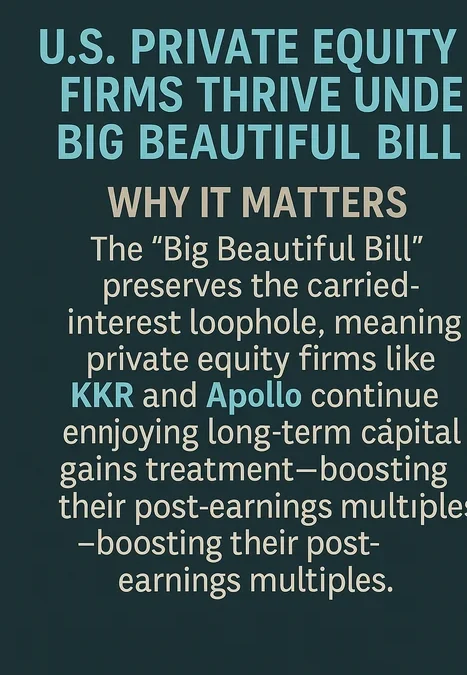Why KKR & Apollo Just Got a Multi-Billion Dollar Tailwind
In a stunning yet under-reported outcome of the “One Big Beautiful Bill” (OBBB), U.S. lawmakers have preserved the controversial carried interest loophole, delivering a windfall to private equity giants. The move not only dodges decades of reform attempts, but also cements the long-term tax efficiency of the private equity model.
This provision has powerful implications. It means that PE firms can continue to treat performance fees (carried interest) as long-term capital gains—taxed at ~20%, rather than ~37% income tax levels. Investors have taken notice.
Stock Snapshot: NYSE-Listed Private Equity Surge
- KKR (NYSE: KKR): +3.2% over 48 hours
- Apollo Global (NYSE: APO): +5.1% rally
- Blackstone (NYSE: BX): +2.9% with strong volume
- Carlyle Group (NASDAQ: CG): +2.4% gain
Investor flows are favoring the entire alternative assets sector, with ETFs like the Invesco Global Listed Private Equity ETF (PSP) jumping 2.6% in the same period.
Why This Loophole Still Exists
Despite bipartisan pledges to close it—dating back to Obama and even Trump’s own earlier comments—the final version of the OBBB quietly excluded the repeal. Lobbying from financial institutions and a desire to keep capital investment competitive were cited as reasons.
“This was a political calculation dressed as tax policy,” said an analyst at Goldman Sachs.
Strategic Implications for the Industry
- Enhanced After-Tax Profits
With capital gains rates preserved, private equity firms keep more of their performance-based income, allowing them to distribute higher profits to partners and investors. - Increased Deal Volume
With the incentive structure intact, expect an acceleration in M&A, especially in distressed assets and technology carve-outs. - Global Competitiveness Restored
Europe is cracking down on PE tax loopholes; the U.S., meanwhile, has made its PE sector the most tax-advantaged in the world—attracting global capital inflows.
Valuation & Forward Guidance
- KKR is trading at ~13.5x forward earnings, with earnings growth expected to hit 18% in 2025.
- Apollo boasts $651B AUM, and analysts have raised PT from $118 to $130.
- Blackstone continues to dominate in real estate PE, with ~$1T AUM milestone in sight.
Expect continued bullish sentiment if the current macro tailwinds (low rates, dealmaking boom, tax shielding) persist.
Risks to Watch
- Political Reversal: A Democratic wave in future elections could threaten the loophole.
- Public Sentiment: Media and voter backlash may build, especially as economic inequality widens.
- SEC Scrutiny: Regulatory oversight of PE fee disclosures remains a potential headwind.
Investment Scenarios
Bull Case (~40%)
Continued favorable tax policy + inflows from pension funds lead to 20–30% stock appreciation in 6–12 months.
Base Case (~50%)
Earnings meet expectations, but no further tax gains: stock performance mirrors broader market with 8–12% upside.
Bear Case (~10%)
Tax reform becomes political issue in Q4 2025 or early 2026 elections, triggering 10–15% revaluation down.
Bottom Line
The “Big Beautiful Bill” wasn’t just about income tax—it redefined how private capital is taxed and valued. With carried interest safe (for now), PE firms have emerged as one of the biggest structural winners from the legislation.
For investors, long positions in major private equity names look increasingly compelling, especially on any short-term dips. But keep one eye on Washington—what policy gives, politics can take away.
Final Verdict
- Existing holders: Hold or add on weakness.
- New investors: Buy KKR or Apollo in tranches below current P/E of 14, hedge using long-dated puts if uncertain about political outlook.
- ETF Option: For diversified exposure, consider PSP or iShares Listed Private Equity UCITS (EURONEXT).
Disclaimer: This article is for informational purposes only and not investment advice. Consult your financial advisor before making any investment decisions.

